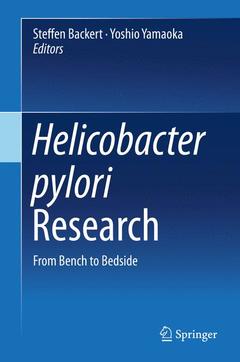Description
Helicobacter pylori Research, Softcover reprint of the original 1st ed. 2016
From Bench to Bedside
Language: English
Subjects for Helicobacter pylori Research:
Keywords
H. pylori. Gastric cancer. Pathogenesis. Eradication therapy. Co-evolution
Publication date: 05-2016
Support: Print on demand
Publication date: 05-2018
Support: Print on demand
Description
/li>Contents
/li>Comment
/li>
This book provides the current updated knowledge on all essential aspects in the rapidly evolving area of Helicobacter pylori research. H. pylori is a class I carcinogen and one of the most common infections in the world. While most people colonized by H. pylori will remain asymptomatic, up to 20 % of them may develop serious gastroduodenal disease such as peptic ulcers or gastric cancer. H. pylori is the only known bacterium linked to the development of cancer and consequently is an important focus of research. Outstanding international experts from diverse scientific disciplines contribute here to give detailed insights into the current understanding concerning the physiology and role of this pathogen. Both basic science and clinical research with actual practical consequences are taken into account. The chapters target microbiology, epidemiology, genetics, biochemistry, interactions with the immune system, signal transduction, pathogenic mechanisms inthe gastroduodenal mucosa, gastric disease development, and therapy including antibiotics or probiotics treatment as well as vaccination strategies. This book is an important reference not only for clinicians but also microbiologists. It provides in a single volume an up-to-date summary of our current knowledge of this microbe and the multiple ways in which it impacts upon public health in all parts of the world.
PART 1 BACTERIOLOGY AND MOLECULAR BIOLOGY.- 1 Helicobacter pylori: genetics, recombination, population structure and human migrations.- 2 Adaptation of Helicobacter pylori metabolism to persistent gastric colonization.- 3 Virulence mechanisms of Helicobacter pylori: an overview.- 4 Roles of the cagPAI and CagA on gastroduodenal diseases.- 5 Helicobacter pylori vacuolating toxin.- 6 Roles of the BabA and the SabA adhesins in gastroduodenal diseases.- 7 Emerging novel virulence factors of Helicobacter pylori.- 8 The primary transcriptome and non-coding RNA repertoire of Helicobacter pylori.- 9 Genome evolution: Helicobacter pylori as an extreme model.- 10 Non-Helicobacter pylori Helicobacter infections in humans and animals.- PART 2 IMMUNE RESPONSES AND HOST FACTORS.- 11 Animal Models of Helicobacter pylori Infection.- 12 Helicobacter pylori and the host immune response.- 13 The role of inflammatory responses in mouse gastric tumorigenesis.- 14 Influence of host gene polymorphisms ondevelopment of gastroduodenal diseases.- PART 3 HELICOBACTER PYLORI-ASSOCIATED DISEASES.- 15 Helicobacter pylori and Nonmalignant Diseases.- 16 Helicobacter pylori and gastrointestinal polyps.- 17 Helicobacter pylori infection and gastric cancer.- 18 Helicobacter pylori infection and MALT lymphoma.- 19 Helicobacter pylori infection in children.- PART 4 TREATMENT OF HELICOBACTER PYLORI.- 20 Helicobacter pylori therapy.- 21 Management of H. pylori infection in Europe.- 22 Population-based strategies for Helicobacter pylori-associated disease management: Latin American perspective.- 23 Population-based strategies for Helicobacter pylori-associated disease management: Asian perspective.- 24 Probiotics as an alternative therapy for Helicobacter pylori-associated diseases.- 25 Vaccination against Helicobacter pylori infection.




